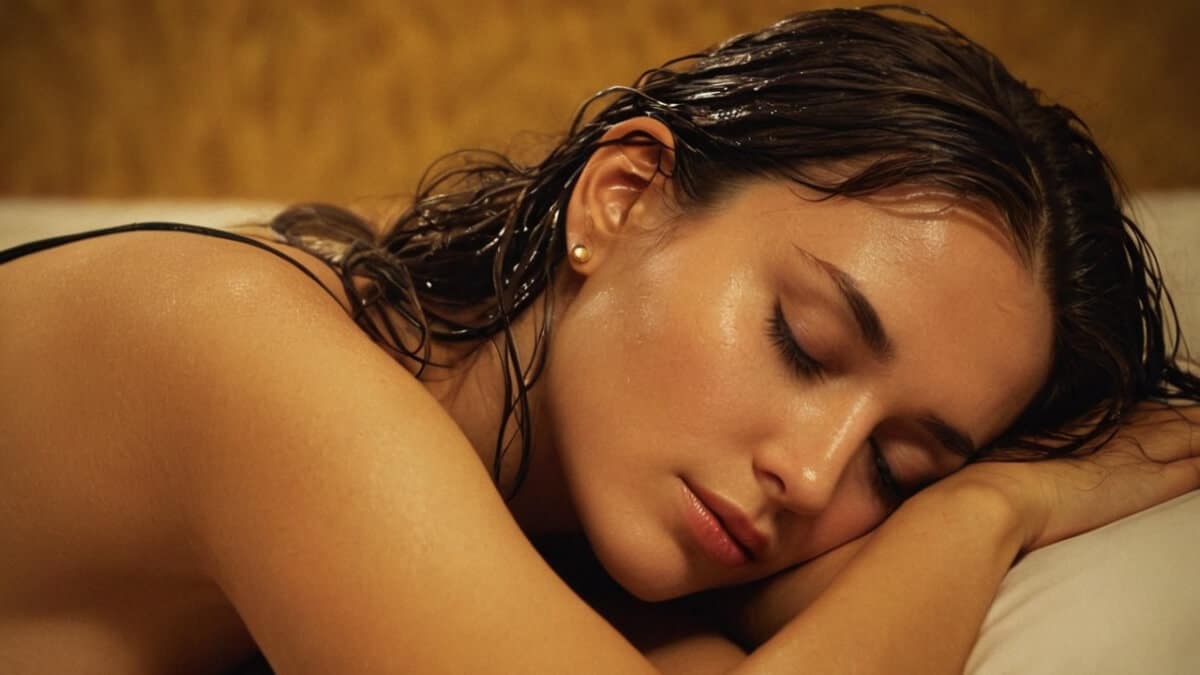Have you ever heard that sleeping with wet hair will make you sick? You’re not alone. Sleeping with wet hair is a common practice for many, whether due to time constraints or a preference for nighttime showers. However, you should be aware of the potential implications of this habit on your hair and overall health. There are several factors to consider, from concerns about hair damage and scalp issues to the impact on your sleep quality.
So do you ever think of knowing the facts behind this advice? If you aren’t then it’s time to know it. Going to bed with wet or damp hair can keep its moisture causing inflaming the scalp which results in an annoying itching sensation.
In addition, this creates damage to the hair. Surprisingly enough, even keeping a towel on your head for too long can have the equivalent effect of retaining moisture.
As per the survey, nearly 45 percent of girls prefer to wash their hair at night. If you are doing the same for the past couple of months then it’s time to put an end to this.
To get more facts about questions like –
- Does going to bed with wet hair make you sick?
- And even if it doesn’t, does it harm your hair?
We went to the experts to find out if the advice held up or not.
Facts By Doctor: Will Sleeping With Wet Hair Make You Sick?

As Per Sophia Devis, MD(Family Medicine Physician), you may feel physically cold if you sleep with wet or damp hair, but this will not cause illness. The common cold is caused by a virus that is in no way related to how damp or dry your hair is.
On the contrary, sleeping with wet hair can cause an entirely different set of issues for your scalp. If facts are to be believed a chronically damp or wet pillow may become a breeding ground for bacterial or fungal infections since the combination of warmth and moisture allows many fungal elements to thrive. That could result in dandruff, the most obvious sign of which is a chronically red, itchy, or flaky scalp.
Illnesses Caused By Sleeping With Wet Hair:
1. Hair Breaking
When the hair is wet it makes it more vulnerable to breaking. Therefore, sleeping with wet hair just raises the chance of hair breaking.
2. Dandruff
When your scalp is moist for a longer duration, this interferes with the function of the sebaceous glands. As a result of this, these glands begin producing less or more oil. Additionally, this could also disrupt the normal pH balance of the scalp consequently triggering dandruff or excessive oil on your own scalp.
3. Sticky Hair
Sleeping with wet hair could result in sticky hair. As a result, your hair will become really hard to detangle. This especially applies to individuals with long hair.
4. Infections And Itchy Skin
Sleeping with wet hair also makes the towel and the pillow wet. This makes those places the perfect breeding areas for bacteria. Therefore, this may also lead to diseases of the scalp.
Sleeping with wet hair can also induce your scalp to glow. This happens because of the moisture which is formed on the skin of your scalp which irritates the skin.
5. Headache
As mentioned previously, wet hair can cause some serious health issues and headache is one of them. On the other hand, once we sleep our body’s temperature increases. Hence, due to the temperature differences between the hair and the body, you could start with a headache.
Tips To Minimize Damage If You Sleep With Wet Hair

To minimize damage if you sleep with wet hair, follow these tips:
Gently Blot with a Microfiber Towel
Blot your hair lightly with a microfiber towel or a soft t-shirt to eliminate any excess water. Avoid aggressive rubbing, which can result in hair breakage and frizz.
Apply a Leave-In Conditioner
Use a leave-in conditioner or a lightweight hair serum to add hydration and protect your hair. This can assist to reduce friction and prevent knots while sleeping.
Detangle Carefully
Before you go to bed, gently untangle your hair with a wide-tooth comb. To avoid breaking, start at the ends and work your way up.
Sleep on a Silk or Satin Pillowcase
Silk or satin pillowcases are more gentle on your hair than cotton ones. They minimize friction, hence preventing hair breakage and frizz.
Use a Hair Cap or Scarf
Wear a silk or satin hair cap or wrap your hair in a silk scarf before going to bed. This can help prevent your hair from friction and keep it tight all night.
Avoid Heat Styling
If you intend to sleep with wet hair, try not to use heat styling equipment beforehand. Heat can weaken your hair, leaving it more vulnerable to damage while wet.
Maintain a Healthy Hair Routine
Regular trims, deep conditioning treatments, and avoiding excessive heat and chemical treatments will help your hair stay healthy and robust, even if you occasionally sleep with it wet.
Also Read:
- How To Prevent Hair Loss In Women: Facts And Tips To Fix It
- How To Reduce Face Fat: Facts, Exercise & Home Remedies
- 10 Most Important Things Every Girl Needs to Know About Her Body
Conclusion
While going out with wet hair will not hurt you, however, it’s generally not a good idea for your scalp and hair. Lastly, due to the temperature difference, sleeping with wet hair can also be a cause of muscle pain.
This can appear as severe cramps or facial paralysis. In some rare cases, it might also lead to whole-body paralysis and even be the cause of death. If you are in a hurry then we urge a quick dry using a hairdryer.


